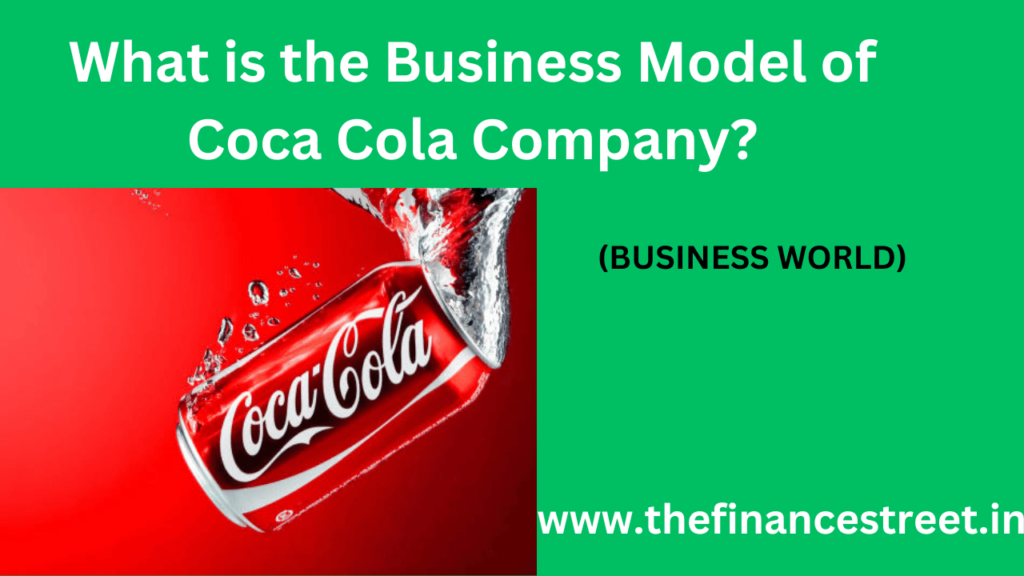Introduction-
The business model of the Coca-Cola Company is built upon a foundation of innovation, global reach, and iconic branding. With a diverse portfolio of non-alcoholic beverages spanning carbonated soft drinks, juices, teas, and sports drinks, Coca-Cola leverages its strong brand equity and extensive distribution network to reach consumers in over 200 countries worldwide. At the heart of its business model lies a commitment to refreshing the world and making a positive difference in communities while delivering value to shareholders.
Central to Coca-Cola’s success is its emphasis on brand strength and marketing prowess. Through memorable advertising campaigns, strategic sponsorships, and product placements, Coca-Cola maintains a pervasive presence in the minds of consumers, reinforcing its position as a symbol of refreshment and enjoyment.
Furthermore, Coca-Cola’s business model is characterized by its decentralized bottling and distribution network, which empowers local bottlers to produce, package, and distribute its beverages. This approach enables Coca-Cola to adapt to regional tastes and preferences while optimizing operational efficiency and reducing costs. By fostering partnerships with bottling companies and investing in sustainability initiatives, Coca-Cola remains committed to delivering quality products to consumers while minimizing its environmental footprint and contributing to the communities it serves.
What is the Business Model of Coca Cola Company?
The business model of the Coca-Cola Company revolves around the production, distribution, and marketing of non-alcoholic beverages. Here are the key components of its business model:
Product Portfolio- Coca-Cola offers a diverse range of non-alcoholic beverages, including carbonated soft drinks (Coca-Cola, Diet Coke, Sprite), non-carbonated beverages (Minute Maid, Powerade, Dasani), and ready-to-drink teas and coffees (Gold Peak, Fuze).
Global Presence- The company operates on a global scale, with its products sold in over 200 countries. It leverages its extensive distribution network and partnerships with bottling companies to reach consumers across diverse markets.
Brand Equity and Marketing- Coca-Cola has built strong brand equity through iconic branding, advertising, and marketing campaigns. It invests heavily in advertising and sponsorships to maintain brand visibility and consumer engagement.
Bottling and Distribution Network- Coca-Cola operates a franchised bottling system, where independent bottlers manufacture, package, and distribute its beverages. This decentralized model allows the company to adapt to local tastes and preferences while maximizing efficiency in production and distribution.
Innovation and Diversification- The company continuously innovates its product offerings to meet changing consumer preferences and health trends. It has expanded its portfolio to include healthier beverage options, such as low-sugar and no-sugar alternatives, as well as functional beverages.
Sustainability and Corporate Social Responsibility- Coca-Cola prioritizes sustainability and corporate social responsibility initiatives, including water stewardship, packaging recycling, and community development programs. It aims to minimize its environmental impact while contributing positively to the communities it serves.
Strategic Partnerships and Acquisitions- Coca-Cola forms strategic partnerships and acquisitions to expand its product portfolio, enter new markets, and enhance its capabilities. Recent examples include partnerships with coffee companies (Costa Coffee) and acquisitions of beverage brands (Topo Chico, BodyArmor).
Overall, the Coca-Cola Company’s business model emphasizes brand strength, global reach, innovation, and sustainability, enabling it to maintain a leading position in the non-alcoholic beverage industry.
What is the formation history of Coca Cola Company?
The Coca-Cola Company has a rich history that dates back to the late 19th century. Here’s an overview of its formation history:
Inception by John S. Pemberton- The Coca-Cola Company was founded by John Stith Pemberton, a pharmacist from Atlanta, Georgia, in 1886. Pemberton created a flavored syrup by mixing coca leaf extract with cola nut extracts, along with other ingredients, intending it as a medicinal tonic.
First Sale at Jacobs’ Pharmacy- The first sale of Coca-Cola was made at Jacobs’ Pharmacy in Atlanta on May 8, 1886. The syrup was mixed with carbonated water, creating the iconic beverage that would soon gain popularity.
Early Growth and Expansion- As demand for Coca-Cola grew, Pemberton’s partner, Frank M. Robinson, suggested the name “Coca-Cola” and designed its distinctive script logo. The company was incorporated in 1892, and Coca-Cola began to be sold in bottles in addition to fountain drinks.
The Acquisition by Asa Candler- In 1887, Pemberton sold his remaining interest in Coca-Cola to Asa Griggs Candler, an Atlanta businessman. Under Candler’s leadership, Coca-Cola’s marketing efforts expanded, including the distribution of promotional items and the introduction of the iconic contour bottle in 1916.
Global Expansion: Coca-Cola’s growth continued through the 20th century, with the company expanding its operations internationally. The beverage became synonymous with American culture and was marketed as a symbol of refreshment and happiness worldwide.
Public Listing and Diversification- The Coca-Cola Company went public in 1919, and over the years, it diversified its product portfolio beyond the original Coca-Cola beverage. It acquired or developed other popular brands, including Sprite, Fanta, Minute Maid, and Powerade.
Recent Developments- In recent decades, Coca-Cola has faced challenges and opportunities in response to changing consumer preferences and health trends. The company has focused on innovation, introducing new beverage formulations and packaging options to meet evolving consumer demands.
Currently, the Coca-Cola Company remains one of the world’s leading beverage companies, with a global presence and a diverse portfolio of brands. Its formation history reflects a journey of entrepreneurship, innovation, and cultural impact that spans over a century.
What are the important aquisitions of Coca Cola Company?
The Coca-Cola Company has made several important acquisitions throughout its history to expand its product portfolio, enter new markets, and enhance its capabilities. Here are some notable acquisitions by Coca-Cola:
Columbia Pictures- In 1982, Coca-Cola acquired Columbia Pictures Industries, Inc., one of the major film studios in Hollywood. The acquisition aimed to diversify Coca-Cola’s business interests beyond beverages and leverage the entertainment industry’s potential for synergies with Coca-Cola’s marketing and branding efforts. However, Coca-Cola later sold Columbia Pictures to Sony Corporation in 1989.
Costa Coffee- In 2018, Coca-Cola acquired Costa Limited, a leading coffeehouse chain based in the United Kingdom. This acquisition allowed Coca-Cola to enter the rapidly growing global coffee market and diversify its beverage offerings beyond traditional soft drinks. Costa Coffee operates a network of coffee shops and also sells packaged coffee products, providing Coca-Cola with opportunities for growth in the beverage industry.
Energy Brands (Glacéau)- In 2007, Coca-Cola acquired Energy Brands, Inc., known for its Glacéau brand of enhanced water products, including Vitaminwater and Smartwater. This acquisition allowed Coca-Cola to tap into the growing market for functional and enhanced beverages, particularly among health-conscious consumers seeking alternative hydration options.
Monster Beverage Corporation- In 2014, Coca-Cola acquired a minority stake in Monster Beverage Corporation, a leading energy drink company. As part of the deal, Coca-Cola transferred its energy drink brands, including NOS, Full Throttle, and Burn, to Monster Beverage Corporation, while gaining ownership of Monster’s non-energy drink brands. This strategic partnership provided Coca-Cola with exposure to the fast-growing energy drink market and strengthened its position in the beverage industry.
Topo Chico- In 2017, Coca-Cola acquired Topo Chico, a premium sparkling mineral water brand based in Mexico. This acquisition allowed Coca-Cola to expand its presence in the sparkling water segment and capitalize on the growing consumer demand for healthier beverage options. Topo Chico has since become a key brand in Coca-Cola’s portfolio, particularly in the premium water category.
These acquisitions reflect Coca-Cola’s strategic efforts to diversify its product offerings, expand its global footprint, and capitalize on emerging trends in the beverage industry. By acquiring established brands and companies with complementary strengths, Coca-Cola aims to strengthen its competitive position and drive growth in new markets and product categories.
What are the competative advantages of Coca Cola Company?
The Coca-Cola Company enjoys several competitive advantages that have contributed to its long-standing success and market leadership in the beverage industry:
Strong Brand Equity- Coca-Cola boasts one of the most recognizable and valuable brands in the world. Its iconic logo, memorable advertising campaigns, and association with positive emotions such as happiness and refreshment have built strong brand loyalty among consumers, providing a competitive edge over rivals.
Global Reach and Distribution Network- Coca-Cola operates in over 200 countries worldwide, with an extensive distribution network that reaches even remote and underserved markets. This global presence allows Coca-Cola to capitalize on economies of scale, leverage local partnerships, and adapt its products to diverse cultural preferences, giving it a competitive advantage over smaller competitors.
Diversified Product Portfolio- Coca-Cola offers a diverse range of beverages beyond its flagship cola, including carbonated soft drinks, juices, sports drinks, and bottled water. This diversified product portfolio allows Coca-Cola to cater to a wide range of consumer tastes and preferences, reducing its dependence on any single product category and providing resilience against market fluctuations.
Marketing and Advertising Capabilities- Coca-Cola is renowned for its innovative and impactful marketing and advertising campaigns. By investing heavily in branding, sponsorships, and promotions, Coca-Cola maintains a strong presence in the minds of consumers, reinforcing its brand image and driving consumer engagement. Its marketing prowess serves as a competitive advantage in capturing market share and sustaining brand loyalty.
Bottling and Distribution System- Coca-Cola operates a decentralized bottling and distribution system, partnering with independent bottlers worldwide to manufacture, package, and distribute its beverages. This system allows Coca-Cola to efficiently serve local markets, adapt to regional preferences, and respond quickly to changing consumer demands, providing a competitive advantage in supply chain management and market responsiveness.
Continuous Innovation and Adaptation- Coca-Cola has a long history of innovation, constantly introducing new products, flavors, and packaging options to meet evolving consumer trends and preferences. By staying ahead of the curve and embracing technological advancements, Coca-Cola maintains its relevance in the dynamic beverage industry, securing a competitive advantage in product innovation and differentiation.
The combination of strong brand equity, global reach, diversified product portfolio, effective marketing, efficient distribution system, and continuous innovation positions Coca-Cola as a formidable competitor in the beverage industry, enabling it to sustain its market leadership and drive long-term growth and profitability.
What is the comparative analysis of Coca Cola and Pepsi Company?
A comparative analysis of Coca-Cola and PepsiCo, two of the world’s largest beverage companies, reveals both similarities and differences in their business strategies, product portfolios, and market performance:
Business Strategies:
Coca-Cola- Coca-Cola’s business strategy focuses on building and maintaining strong brand equity, expanding its global presence, and diversifying its product offerings. The company emphasizes innovation, marketing, and partnerships to drive growth and sustain its competitive advantage.
PepsiCo- PepsiCo’s business strategy emphasizes a diversified portfolio approach, with a focus on both beverages and snacks. The company has pursued acquisitions and partnerships to expand its product offerings and capture market share in multiple categories, including carbonated soft drinks, non-carbonated beverages, snacks, and healthier alternatives.
Product Portfolios:
Both Coca-Cola and PepsiCo offer a diverse range of beverages, including carbonated soft drinks, juices, sports drinks, bottled water, and ready-to-drink teas and coffees. However, PepsiCo has a stronger presence in the snacks category with brands like Lay’s, Doritos, and Quaker, diversifying its revenue streams beyond beverages.
Coca-Cola’s product portfolio is centered around its flagship cola brand, while PepsiCo’s portfolio includes multiple beverage brands such as Pepsi, Mountain Dew, Gatorade, and Tropicana, catering to a broader range of consumer preferences.
Market Performance:
Coca-Cola and PepsiCo are both dominant players in the global beverage industry, with Coca-Cola often leading in carbonated soft drinks and PepsiCo holding a strong position in both beverages and snacks.
While Coca-Cola has a larger share of the global carbonated soft drinks market, PepsiCo has diversified revenue streams from snacks and healthier alternatives, providing resilience against declining soda consumption trends.
Both companies face challenges related to changing consumer preferences, health concerns, and regulatory pressures, leading to increased focus on innovation, product diversification, and marketing initiatives to drive growth and maintain market share.
Marketing and Branding:
Coca-Cola and PepsiCo are known for their iconic branding and marketing campaigns, often engaging in competitive advertising and sponsorships. The “cola wars” between Coca-Cola and PepsiCo have become legendary, with both companies vying for consumer attention and loyalty through memorable advertisements and promotions.
In summary, while Coca-Cola and PepsiCo share similarities in their global presence, diversified product portfolios, and marketing prowess, they also exhibit differences in their business strategies, market performance, and brand positioning. Despite intense competition, both companies continue to innovate and adapt to changing consumer trends to maintain their leadership positions in the beverage industry.
Critical Analysis of Business model of the Coca Cola Company-
A critical analysis of the business model of the Coca-Cola Company reveals several strengths and weaknesses, as well as opportunities and threats, in its approach to operating within the global beverage industry.
Starting with strengths, Coca-Cola’s strong brand equity and iconic branding are undeniable assets that contribute to its market leadership. The company’s ability to maintain brand resonance and consumer loyalty through memorable advertising campaigns and strategic sponsorships provides a competitive edge. Additionally, Coca-Cola’s diversified portfolio of beverages allows it to cater to a wide range of consumer preferences, thereby mitigating risks associated with fluctuations in demand for any single product.
However, the business model of Coca-Cola also faces significant challenges and weaknesses. One notable weakness is its heavy reliance on sugary carbonated beverages, which have faced increasing scrutiny due to health concerns and shifting consumer preferences toward healthier options. This dependence on a single product category poses risks to Coca-Cola’s long-term sustainability and profitability, particularly in the face of regulatory pressures and changing consumer attitudes toward sugary drinks.
Moreover, Coca-Cola’s decentralized bottling and distribution system, while providing flexibility and adaptability to local markets, can also lead to inconsistencies in product quality and marketing strategies across regions. This decentralized approach may hinder the company’s ability to implement global initiatives and maintain brand consistency, potentially impacting brand perception and consumer trust.
Furthermore, Coca-Cola faces intensifying competition from both traditional rivals and emerging players in the beverage industry, including smaller, niche brands that appeal to specific consumer segments. As consumer preferences evolve and new trends emerge, Coca-Cola must continuously innovate its product offerings and marketing strategies to stay relevant and competitive in the marketplace.
While the Coca-Cola Company’s business model has proven resilient and successful over the years, it is not without its challenges and areas for improvement. To sustain its leadership position in the global beverage industry, Coca-Cola must address weaknesses such as its reliance on sugary beverages, enhance brand consistency across regions, and adapt to evolving consumer trends through innovation and diversification.
Conclusion-
In conclusion, the Coca-Cola Company’s business model epitomizes resilience, adaptability, and brand excellence in the global beverage industry. By cultivating a diverse portfolio of products, leveraging its iconic branding, and maintaining an expansive distribution network, Coca-Cola has solidified its position as a market leader for over a century. Through strategic partnerships, innovative marketing campaigns, and a commitment to sustainability, the company continues to innovate and evolve, meeting the changing needs and preferences of consumers worldwide.
Moreover, Coca-Cola’s decentralized bottling and distribution system have proven instrumental in ensuring flexibility and responsiveness to local markets, while its focus on sustainability underscores a commitment to environmental stewardship and corporate social responsibility. By investing in community development projects, promoting water stewardship, and advancing packaging recycling initiatives, Coca-Cola demonstrates a dedication to making a positive impact beyond its core business operations.
Looking ahead, Coca-Cola’s business model is poised to navigate emerging challenges and capitalize on opportunities presented by evolving consumer trends, technological advancements, and global market dynamics. With a steadfast commitment to innovation, sustainability, and consumer satisfaction, the Coca-Cola Company remains well-positioned to sustain its legacy of refreshing the world and delivering value to shareholders, consumers, and communities alike.



